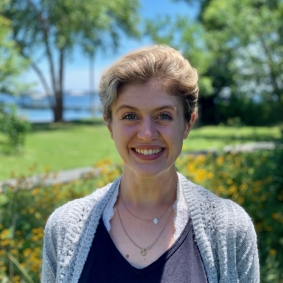Knauss legislative fellowships in Congress help build careers — and they're fun and educational. See our video and fact sheet for details.
Caroline Wiernicki

Caroline is serving as the Knauss Marine Policy Fellow in the Office of the Oceanographer of the Navy. During her fellowship she will be working on interagency policy, with issue topics relating oceanography, meteorology, precise time, and astrometry.
Caroline obtained degrees in Environmental Science (BS) and English (BA) from Duke University. While at Duke, she worked on research projects including the spread of invasive seagrass in the Caribbean, competing population dynamics of seals in the West Atlantic, and community-based conservation practices in small scale fisheries in the Gulf of California. After completing her undergraduate study, she returned home to Maryland, obtaining her M.S. degree from University of Maryland Center for Environmental Science’s Chesapeake Biological Laboratory. Her master’s work focused on the disturbance ecology of black sea bass off the coast of Maryland, using acoustic telemetry coupled with an oceanographic model to track changes in black sea bass movement behavior in response to summer storm events. In her free time, Caroline enjoys running, reading, and any activity that gets her out on or in the water.
Call for Symposium Presenters and Authors
The Chesapeake Rising: Innovative Law and Policy Solutions for Climate Adaptation in Coastal Communities symposium will explore key legal and policy considerations that affect climate adaptation strategies. It provides a unique opportunity for upper-level law students and early-career lawyers to present and publish their legal scholarship.
Program Announcements
-
-
Maryland Sea Grant has program development funds for start-up efforts, graduate student research, or strategic support for emerging areas of research. Apply here.
News and Blogs
Video Gallery
Sea Grant Film Explores a Diminishing Smithville
Smithville is a community on Maryland’s Eastern Shore, on the edge of the Blackwater National Wildlife Refuge. A century ago, Smithville had more than 100 residents. Today, it has four, in two homes: an elderly couple, and one elderly woman and her son, who cares for her.
Featured Fellow
Featured Research Project
Developing a habitat model for mysids, an important link in Chesapeake Bay food webs
Mysids are important mesozooplankton prey for many species of fish in Chesapeake Bay and are an important link in transferring energy from lower to upper trophic levels. Mysids also serve as biological vectors for benthic-pelagic coupling due to their diel vertical migration and omnivorous prey-switching behavior, which makes mysids important regulators of food web architecture. Despite their central role in coastal food webs, surprisingly little is known about mysid ecology and dynamics in Chesapeake Bay.
The Blue Crab: Callinectes Sapidus
An essential resource for researchers, students, and managers. Get your copy today!


©2025 Maryland Sea Grant. All rights reserved.
5825 University Research Court, Suite 1350 | College Park, MD 20740
Phone: (301) 405-7500 | Fax: (301) 314-5780 | Contact Us



